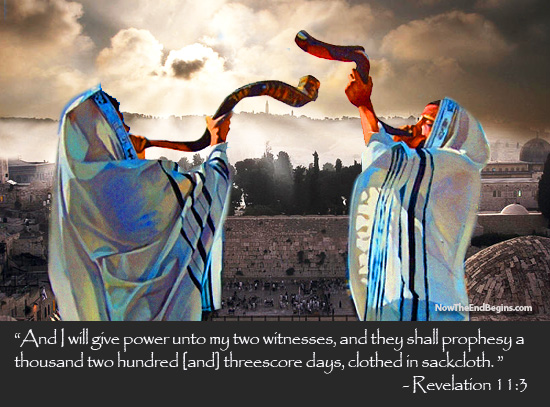The Two Witnesses Explained
It was shown in part two of this commentary that Greek ordinarily uses the definite article when the noun it modifies has been previously mentioned.
Now, the witnesses in verse 3 have not been previously mentioned, but the Speaker designates them as “THE two witnesses,” thus indirectly informing the reader that they are definite persons whose identities can easily be ascertained from the Old and the New Testaments.
The angel Gabriel, speaking to Zechariah about the child to be born and named John, said,
“He will go forth before him [the Lord], in the spirit and power of Elijah, to turn the hearts of parents to their children, and the disobedient to the wisdom of the righteous, to make ready a people prepared for the Lord.” [Lk. 1:17]
Speaking about John the Baptist, Jesus said,
“...And if you will to accept it, he is Elijah who is to come.” [Mt. 11:14]
Jesus also said of Elijah,
“Elijah is indeed coming first to restore all things… But I tell you, Elijah has come, and they did to him [John] whatever they pleased, as it is written of him.” [Mk. 9:12]
Finally, people asked John the Baptist, “Are you Elijah?” And, John replied, “I am not” [John 1:21]. The apparent contradiction is cleared away by distinguishing between the office or “spirit” of prophet and the person of the prophet himself, as Jesus and Gabriel make clear enough to those willing to discern it.
One very important point is implied: as John the Baptist preceded Christ's coming, so will Elijah precede the great day of the Lord. Compare what Gabriel said about John, with this citation from Malachi 3:22-24,
“Remember the law of Moses my servant, which I enjoined upon him on Horeb, the statutes and ordinances for all Israel. Lo! I will send you Elijah, the prophet, before the day of the Lord comes, the great and terrible day, to turn the hearts of the fathers to their children, and the hearts of the children to their fathers, lest I come and strike the land with doom.”
Bear in mind that the conversion of the Jews begins with the survivors of the earthquake in Jerusalem [11:13], and that the third woe will come quickly after that [11:14]. The Jews will not be punished in the third woe: God will not come and “strike the land with doom,” as is evidenced in Chapter 21 where the names of the Twelve Tribes are included in the New Jerusalem of the Millennium.
The third woe is the seven last plagues [divine punishments] described in Chapter 16; and, in 16:14, John describes the closing event, when demonic spirits have assembled the kings of the earth for battle on “THE GREAT DAY OF ALMIGHTY GOD.”
Hence, it is plain and clear that the Two Witnesses will have an important part in the conversion of Israel, just before “the day of the Lord, the great and terrible day.” The Two Witnesses will have the authority and power to issue “fire” from their mouths against their enemies, to order droughts, and to inflict every kind of plague upon the earth, during the 3½ years of their prophesying.
Similarly, it was recorded that Elijah summoned “fire” from heaven;
12 Elias answering, said: If I be a man of God, let fire come down from heaven, and consume thee and thy fifty. And fire came down from heaven, and consumed him and his fifty. [2 Kgs. 1:12];
and that he ordered a drought for 3½ years during the days of King Ahab;
1 And Elias the Thesbite of the inhabitants of Galaad said to Achab: As the Lord liveth the God of Israel, in whose sight I stand, there shall not be dew nor rain these years, but according to the words of my mouth. [1 Kgs. 17:1].
The Two Witnesses will be resurrected after lying dead in a street of Jerusalem for 3½ days, which implies that they had not died on a previous occasion. In agreement with this, it was recorded that Elijah, walking along with the younger man Elisha, was suddenly taken up in a flaming chariot;
11 And as they went on, walking and talking together, behold a fiery chariot, and fiery horses parted them both asunder: and Elias went up by a whirlwind into heaven. [2 Kgs. 2:11];
and it was not recorded that he died: therefore, Christ said of him, “Elijah is indeed coming...” In the entire Bible, only one other person was recorded as not having died: Enoch. This is found in Genesis 5:24, which reads,
“Then Enoch walked with God, and he was no longer here, for God took him.”
The passage does not state the usual formula of “then he died,” and, thereby, it indicates that Enoch did not die. Saint Paul affirmed this,
“By faith Enoch was so taken that he did not experience death.” [Heb. 11:5].
The future coming of Enoch has been recorded,
“Enoch pleased God, and was translated into paradise, that he may give repentance to the nations.” [Sir. 44:16]
The primary mission of the Two Witnesses will be one of mercy, not condemnation. For 3½ years, they will testify, by word and deed, to the divinity of Christ, and to the divine origin of the Roman Catholic Church alone. They will denounce the teachings of the Beast and his chief henchman, the beast “ascending from the earth” [13:11], later called the False Prophet [19:20]. Clothed in sackcloth, the Two Witnesses will live austerely and preach repentance. They will fulfill Christ's words,
“And this good news will be proclaimed in the whole world unto the testimony to the nations, and then will come the end.” [Matthew 24:14].
For their extraordinary service, they will be resurrected and assumed, soul AND body, into heaven. Strictly through the information given in Scripture, I draw the conclusion that the Two Witnesses will be Elijah and Enoch.
